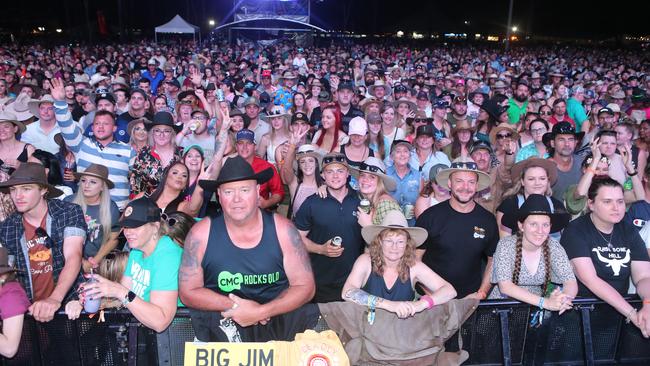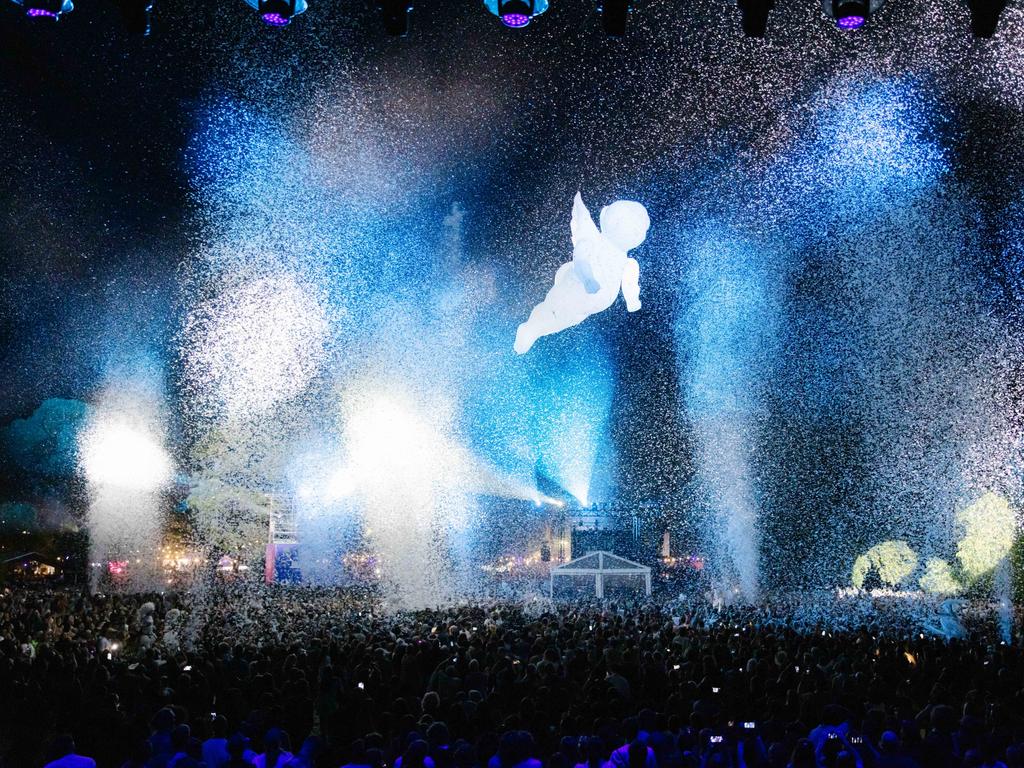CMC Rocks, Knotfest Australia buck festival trend by selling out to niche markets
All concert promoters hope to hear these two beautiful words after their event goes on sale — but they’re also proving mighty hard to achieve in 2023.

They are the two most beautifully melodic and meaningful words that any concert promoter can hope to hear after letting their newest idea loose on the ticket-buying public: sold out.
Yet in the current Australian music festival market, which is being assailed by financial factors on both sides of the stage, those words are proving hard to achieve.
In 2023, the afterglow of a return to mass gatherings has worn off. A glut of international tours visiting our shores this summer has meant that, although fans are spoiled for choice in a way they haven’t been for several years, cost-of-living concerns are biting hard for many.
Today, $200 spent on a one-day festival ticket – or $500 for a three-day pass – has taken on a different psychic weight as household budgets tighten. For event organisers, ballooning inflation has fed into rising fuel, airfare and freight costs across the globe, thereby lowering the margin for error among promoters.
In these headwinds, some multi-genre events are struggling to shift tickets. Last month, Laneway Festival was attended by 100,000 people across five capital city events, with a line-up featuring a range of indie pop, rock, electronic and hip-hop acts. The crowd at the first date in Brisbane felt distinctly smaller than the last edition in 2020, by Review’s estimate, with only about 4000 people staying to watch an excellent headline set by US sister rock trio Haim.
Held next month, Byron Bay Bluesfest has not yet reached capacity for its five-day camping festival across the Easter long weekend, despite attempts to entice punters with six successive artist line-up announcements spanning the gamut from blues, rock and R&B, to folk, roots and pop.
Conversely, there have been bright spots in the multi-genre space. In the South Australian capital last weekend, the return of international acts to world music event WOMADelaide – featuring more than 700 artists from 30 countries – saw three of its four days sell out at a bumper daily capacity of 30,000. Half the advance sales were to interstate visitors, and organisers reported a record number of first-time attendees.
Meanwhile, two major festivals to be held this month – one established, one new – have found success by ignoring general interests and targeting highly engaged market niches.
This weekend near Brisbane, country music festival CMC Rocks will play to about 23,000 people, offering a line-up stacked with some of the genre’s biggest American stars – including man of the moment Morgan Wallen, who this week achieved a rare double of topping both the US Billboard album and single charts.

Later this month, Knotfest Australia will make its debut across three cities in three days, when about 90,000 heavy metal fans will gather to worship at the altar of masked Iowa headliners Slipknot, as well as the likes of Byron Bay quintet Parkway Drive and veteran “big four” metal act Megadeth.
The respective sellouts show how two local promoters have navigated what can be a ruthless market.
“It’s partly self-selecting, but partly just good fortune that we have an event that has a very specific audience,” says Jeremy Dylan, director of CMC Rocks since 2017. “We’ve been very protective of our audience, and we’ve been trying not to over-saturate and overextend it, and be conscious that people only have so much money.”

Dylan, 33, continues: “I feel a lot for anybody who is running a festival at the moment that’s catering to a more general audience. For a long time, being a festival like ours, the niche audience was ‘the struggle’, and the thing that made it take a long time to build. But it does mean that, now that we have built that audience, we’re in a different position to a lot of other events.”
Since 2015, CMC Rocks has been held at Willowbank Raceway, 55km southwest of Brisbane. When this year’s event – featuring Wallen, Zac Brown Band and Kip Moore – went on sale in October, all 23,000 tickets were sold immediately, marking the event’s sixth sellout and third to reach capacity on the first day of sale. (This is no cheap gig, either: one adult attending for three days while camping on-site is paying a minimum of $677, with a VIP upgrade priced at an extra $259.)
This sort of immediate audience response, says Dylan, triggers “a massive wave of satisfaction, but also a massive wave of relief: as soon as that happens, we know we’re coming back again”.

Now in its 16th year, CMC Rocks has grown gradually to become a clear leader in the genre, and one with plenty of rusted-on loyalists who know they’re in for a good time, based on past experience. But what about trying to establish a new touring festival from a standing start?
That’s the task that Melbourne-based concert promoter Destroy All Lines took on last year, when announcing it was co-promoting the Australian debut of Knotfest, which has been held in eight countries previously, including Japan, Mexico, Germany and Brazil.
How soon into an on-sale day does a promoter get a sense for whether the line-up has been well-received by the target market? “Normally within about a minute,” says Chris O’Brien, general manager of Destroy All Lines, with a laugh. “It doesn’t take long!”
What helped O’Brien and his Knotfest co-promoters, TEG Live and Finely Tuned, is that the festival had attracted more than 50,000 people registering their interest in pre-sale tickets.
“It doesn’t necessarily guarantee you that you’re going to sell that amount of tickets,” he notes with caution. “But for every person that’s registering, they’ll generally buy two tickets per transaction, so it does give you a good indication upfront that you’re going to do well.”
After going on sale in November, the tour saw the “sold out” sign go up sequentially: Melbourne was pre-Christmas, Brisbane was last month, and the final tickets for Sydney were purchased this week. All told, about 90,000 fans will attend the three shows, closely mirroring the number that attended the promoter’s alternative music festival Good Things across the same three cities in December.

O’Brien, 50, is the former general manager of Soundwave Festival, which toured nationally from 2008 to 2015, and specialised in presenting metal, rock and punk acts, and associated subgenres. He has carried on that spirit with Destroy All Lines, a tour promotion business with about 12 staff that has also recently launched niche festival brands such as Monolith (progressive metal) and Daydream (alternative/indie rock).
“I never wish ill of anyone that’s promoting festivals because I understand how difficult they are and the amount of risk that is involved,” he says. “It’s certainly not easy out there. We’re probably fortunate that we work in a space that really not a lot of other promoters touch.”
You may have found a familiar Talking Heads refrain running through your head as you’ve been reading: same as it ever was, right? In an open market, promoters pick their battles. Some win, some lose – isn’t that how it has always gone in the concert business?
That’s true, but unbeknown to the average festival attendee – who might think that booking a few hot bands is a sure-fire way to financial success – the margins at major events today are such that most, if not all, allocated tickets need to be sold before the people running the festival are back in the black.
“Just because there were 11,000 people there doesn’t mean that you are in profit, because you’re essentially building a city when you put these events on,” says Dylan. “And we go after the biggest names in one of the biggest genres in the world, and that costs a lot of money. We have to spend more money every year to keep the standards up. You just have to sell a lot of tickets before you get past the break-even point.”
With a rueful laugh, Dylan says, “You could argue that’s an insane business model, and I wouldn’t necessarily disagree with you.”
On this subject, O’Brien pushes back at the conventional wisdom that festivals generally need to come close to selling out to make a profit.
“No, not for us,” he replies. “If that was the case, I don’t think we’d be in business very long, because not every tour we’re selling out. The bigger the tours are, the less that’s actually in it for the promoters; the more back-end goes to the artists, and then all your costs are incredibly expensive on every line item. It doesn’t take much to be down in ticket sales across five cities to lose a hell of a lot of money.”

For Dylan, O’Brien and their respective teams working on CMC Rocks and Knotfest Australia this month, they know they’ve nailed their offerings to their niche markets because there’s no more tickets available. That’s one job done.
All that’s left to do is what they’re both industry leaders at: producing quality festivals, and delivering on the faith that country music and heavy metal fans have placed in them.
They’ll sleep soundly in the lead-up to show day because the two most beautiful words – sold out – have been looping through their minds. And next year, like the rest of their colleagues in the concert promotion business, they’ll try to do it all again.
CMC Rocks QLD is being held from Friday to Sunday at Willowbank Raceway, Ipswich.
Knotfest Australia will be held at Melbourne’s Flemington Racecourse (March 24), Sydney’s Centennial Park (March 25) and Brisbane Showgrounds (March 26).





To join the conversation, please log in. Don't have an account? Register
Join the conversation, you are commenting as Logout